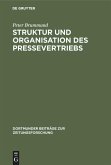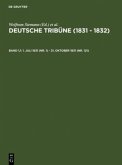Paparazzi or investigative journalists? Aside from such slogans, the role of the press is much discussed and very controversial. However, its importance â?? and its status as an instance of power in society â?? is widely accepted. Finally, the people themselves are crucial; those who follow critically events in politics, culture, the economy and society, and convey them to the public. This biographical encyclopaedia presents more than 7,000 persons from the media, publicist circles and the press, who were active in the German cultural area, from the 17th century up to the present. Besides journalists and publishers, the broad selection also covers editors, critics, press photographers, illustrators, caricaturists, the owners of printing plants, and professionals dealing with reader circles and sales, as well as scholars studying the press. The articles provide information on the dates of life and death, biographical background, education and professional career of the persons recorded. 207 detailed articles have been written and signed by experts. Access to the entries is facilitated by an index of German-language printed media, showing which newspapers and journals the recorded individuals worked for. Die deutschsprachige Presse contains biographical articles about well-known publishers such as Karl Gerold, Marion Gräfin Dönhoff, Axel Springer or Rudolf Augstein. Naturally, music, art, literature, theatre and film critics like Ludwig Börne, Eduard Hanslick, Alfred Kerr or Joachim Ernst Berendt are represented. But the group is much larger: many individuals who became famous in other contexts, worked at least occasionally as journalists, including the likes of Gotthold Ephraim Lessing, Karl Philipp Moritz, Robert Schumann and Theodor Fontane. Moritz von Schwind and George Grosz, for example, worked as illustrators. Further, scientists from a variety disciplines can be found: the philosopher Walter Benjamin and the sociologists Siegfried Kracauer and Theodor W. Adorno, along with Emil Dovifat, a scholar of journalism, and the literary scholar Hans Mayer. With politics there are many points of contact. Journalists and publicists act not only as critical observers but also as participants. Melchior von Grimm, for example, known primarily for his involvement with the »Encyclopedie«, also worked as a diplomat. The dangers accompanying the publicistâ??s fight against social grievances are illustrated by the biography of the poet and composer Christian Friedrich Schubart. As editor of the »Deutsche Chronik« since 1774, he was imprisoned without trial for ten years in the fortress Hohenasperg at the bidding of Herzog Karl Eugens von Württemberg. Leading figures of the German workers movement can also be found in this biographical encyclopaedia: from Karl Marx to Eduard Bernstein and Karl Kautsky, to Julius Leber. Joseph and Julius Bachem, Walter Dirks and Eugen Kogon are examples of those representing political Catholicism. The first president of the Federal Republic of Germany, Theodor Heuss and the first social democratic Chancellor, Willy Brandt also began their professional careers as journalists. Also included is the founder of Zionism, Theodor Herzl. Bertha von Suttner, Ludwig Quidde and Carl von Ossietzky were honoured with the Nobel peace prize for their commitment to social causes and their journalistic activities. Die deutschsprachige Presse provides a chronicle spanning several centuries of politics and culture, and of society and the public domain in the German-speaking regions. It is a work of great interest to scholars of many disciplines â?? for those studying the media and journalism, and for historians and Germanists. A publication which will appeal to everyone interested in the history of journalism in the German-speaking regions.
Diese biographische Enzyklopädie stellt mehr als 6.000 Personen aus Medien, Publizistik und Presse vor, die vom 17. Jahrhundert bis zur Gegenwart im deutschen Kulturraum tätig waren. Die breit angelegte Auswahl bietet neben Journalisten und Verlegern auch Herausgeber, Kritiker, Pressefotografen, Illustratoren, Karikaturisten, Druckereibesitzer, Fachleute für Lesezirkel und Vertrieb sowie Zeitungswissenschaftler. Die Artikel informieren über Lebensdaten, biographischen Hintergrund, Ausbildung sowie beruflichen Werdegang der aufgenommenen Personen. 207 ausführliche Artikel wurden von Experten verfasst und namentlich gekennzeichnet. Ein Register deutschsprachiger Printmedien, das verdeutlicht, für welche Zeitungen oder Zeitschriften die aufgenommenen Persönlichkeiten gearbeitet haben, erschließt die Einträge.
Hinweis: Dieser Artikel kann nur an eine deutsche Lieferadresse ausgeliefert werden.
Diese biographische Enzyklopädie stellt mehr als 6.000 Personen aus Medien, Publizistik und Presse vor, die vom 17. Jahrhundert bis zur Gegenwart im deutschen Kulturraum tätig waren. Die breit angelegte Auswahl bietet neben Journalisten und Verlegern auch Herausgeber, Kritiker, Pressefotografen, Illustratoren, Karikaturisten, Druckereibesitzer, Fachleute für Lesezirkel und Vertrieb sowie Zeitungswissenschaftler. Die Artikel informieren über Lebensdaten, biographischen Hintergrund, Ausbildung sowie beruflichen Werdegang der aufgenommenen Personen. 207 ausführliche Artikel wurden von Experten verfasst und namentlich gekennzeichnet. Ein Register deutschsprachiger Printmedien, das verdeutlicht, für welche Zeitungen oder Zeitschriften die aufgenommenen Persönlichkeiten gearbeitet haben, erschließt die Einträge.
Hinweis: Dieser Artikel kann nur an eine deutsche Lieferadresse ausgeliefert werden.








